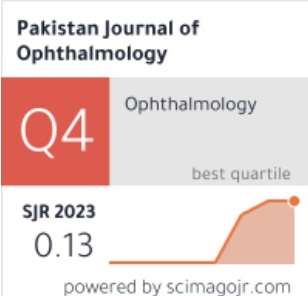Ocular Presentations in Human Immunodeficiency Virus (HIV)/Acquired Immune Deficiency Syndrome (AIDS) Patients undergoing highly- active antiretroviral therapy (HAART) Therapy in Jeddah, Kingdom of Saudi Arabia.
DOI:
https://doi.org/10.36351/pjo.v35i3.902Abstract
Purpose:
To detect the Human Immunodeficiency Virus (HIV)/Acquired Immunodeficiency Syndrome (AIDS) related ocular manifestations in Jeddah, Saudi Arabia.
Study Design: Retrospective study
Place and duration of study: A one-year retrospective study was conducted in Ophthalmology Clinic of East Jeddah Hospital in the western region of the Kingdom of Saudi Arabia, during 2016-2017
Material and methods
A one-year retrospective study was conducted in the Ophthalmology Clinic of East Jeddah Hospital in the western region of the Kingdom of Saudi Arabia, during 2016-2017. 47 referrals of HIV-positive patient data were collected from the Infectious Diseases Department by taking history, clinical examinations and, laboratory investigations. The ophthalmological examination included adnexal examination, bestcorrected visual acuity, intraocular pressure (IOP), anterior and posterior segment examination, B-scan and, MRI.
Results
Out of 47 referred patients from the In and Out-patient Departments in East Jeddah Hospital, patients presented as follows:
Single patient cases of retinal necrosis, anterior uveitis and neovascular glaucoma, with pterygium,sixth nerve palsy, bacterial conjunctivitis and, adenoviral conjunctivitis. Two cases presented with HIV microangiopathy, blepharitis, cortical blindness after brain abscess, herpes infection, Kaposi sarcoma and, cytomegalovirus (CMV) retinitis. Three patients presented with tuberculosis meningitis, and six with dry eyes. Eight patients presented with cataracts, and ten with refractive errors.
Conclusions
Ocular manifestations of HIV infection are relatively infrequent.HAART treatment is responsible for decreasing the HIV-related complications in ophthalmology. The CD4 T-lymphocyte result can be used to predict the beginning of certain eye infections in HIV-positive patients. Hidden indicators of complications of AIDS in patients confirm the strong rationale for alternating visits with those to an ophthalmologist and professionals discussing the best treatment accordingly.
Keywords: Ocular, HIV, AIDS, HAART
Published
How to Cite
Issue
Section
License
Copyright (c) 2019 Muhammad Abdul Rehman Akram

This work is licensed under a Creative Commons Attribution-NonCommercial 4.0 International License.






